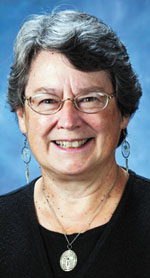By Corinne Winter

A major aspect of the Church reform undertaken at Vatican II had to do with the participation of the Catholic Church in ecumenical dialogue — the conversations among Christians of different denominations about our shared commitment to Jesus Christ and his teaching and our differences regarding the meaning and expression of that faith.
Organized efforts at ecumenical dialogue had been initiated around the time of the world wars by Protestant leaders who believed that Christians, by arguing among themselves and even making public derogatory statements about other denominations, were giving scandal at a time when the world was desperately in need of witnesses to unity and peace. A group calling themselves the “Faith and Order Commission” met several times during the early decades of the 20th century leading to the foundation of the World Council of Churches in 1948. Catholics did participate in ecumenical discussions during the times before the Council, but in 1964, the Council promulgated an official commitment to those efforts calling Christian unity a principal concern and stating that the division “openly contradicts the will of Christ, scandalizes the world, and damages the holy cause of preaching the Gospel” (Unitatis Redintegratio n. 1)
During and shortly after the Council, at least in some places, multiple small groups began to engage in ecumenical activities ranging from prayer to Bible study to service projects. Some of the groups and their work thrived and in some forms continue to this day. In the Quad Cities, the ecumenical group that presents the Pacem in Terris award would be an example. Some groups proceeded with great enthusiasm for a while and then died out. Today, many Christians ask what has become of ecumenism. One even sees some signs of old animosities: people condemning one another for interpreting Christianity in different ways.
Sometimes, people seem to include ecumenism as an example of relativism. They assume that ecumenical openness is a sign that a person is not committed to her of his own faith tradition but views various perspectives as equally valid, even when it comes to fundamental truths of the faith such as the Trinity or the identity and saving work of Jesus the Christ.
However, as Pope Francis has asserted on several occasions, exactly the opposite is true. Ecumenical dialogue requires that we not water down our differences. If I am in conversation with someone who disagrees with me, it is, in fact, disrespectful either to pretend that we really think the same thing or that our differences are unimportant. Rather, we must speak honestly, ask the hard questions, and seek the sources of our differences. Are they rooted in different assumptions, different experiences, or different languages?
Speaking to a delegation from the Orthodox Church, Pope Francis said of differences concerning church structures: “being able to reflect together in truth and charity on these issues, starting from what we have in common without, however, concealing that which still separates us … demands in-depth knowledge of one another’s traditions in order to understand them and sometimes also to learn from them.”
He went on to refer to the Catholic Church’s need to reflect on the Orthodox understanding and practice of “synodality” and how it relates to Episcopal collegiality. In the process, he said, we should set aside fears about dialogue and believe that the Spirit of truth will be at work in our shared efforts to lead us to the whole truth.
Speaking to personnel at an Italian Jesuit journal, he urged them to maintain a spirit of dialogue which, he said, means “being convinced that the other has something good to say, making room for their point of view, their opinion, their proposals, without falling, of course, into relativism.”
In this Year of Faith, then, should we not renew our commitment to ecumenism? Should we not strive to set aside fears that dialogue and other forms of sharing will weaken our commitment to Catholic tradition and recognize instead that faith and the on-going search for truth are essential to one another?
(Corinne Winter is a professor of theology at St. Ambrose University in Davenport.)







